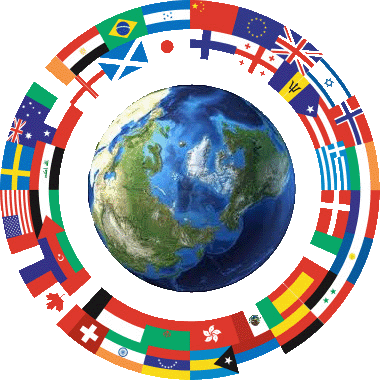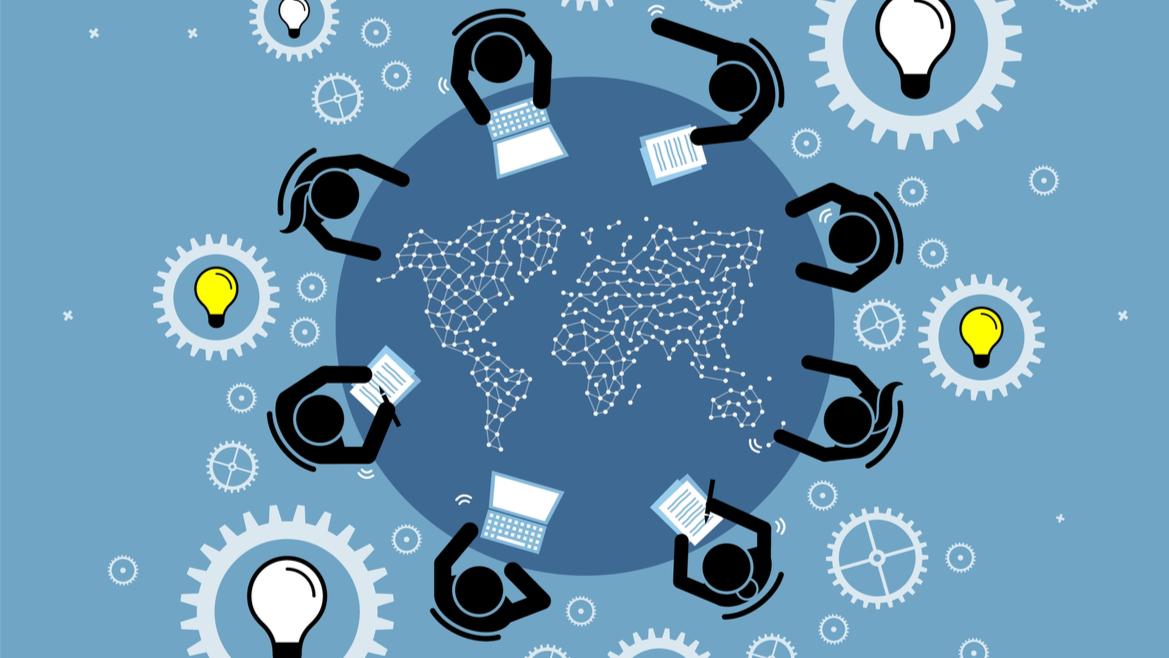China and the World in the Post-Pandemic Era: An Expat Perspective
February 28, 2022
About the author:
David Moser, Associate Professor at Capital Normal University
An Interview with David Moser
The COVID-19 pandemic ultimately proved to be a world-changing event in ways we could have not imagined, impacting almost everyone’s life in profound ways while comprehensively rewriting global political currents. How has the experience of the pandemic played out both in China and overseas? What are its impacts on human-to-human exchanges and relations between China and the United States?
TIO How has the pandemic affected people's attitudes towards the Chinese government, work and life? And what are the important trends to be watching from your view as an expat?
Moser It seems that nearly every aspect of our daily life has been affected by the COVID-19 crisis. I think we're just now assessing what a global new normal would look like.
In addition to the many negative developments that have taken place, I think there are also some positive aspects to take note of. First of all, we are now very aware of how fragile many of our global collaborations can be in the face of a worldwide crisis. This came as a shock for many of us, and it can be very worrying as we move forward. But on the other hand, we have become more aware of our global connectedness and the importance of international cooperation in the event of a worldwide crisis. We have been made more aware, I hope, of the importance of maintaining global cooperation with organizations like the WHO, the United Nations Disaster Relief Organization, and so on.
For us expats, we now realize more clearly that we have to sustain the international basis of these organizations, despite our political differences and historical disputes. Certainly, for us, global travel will probably never be quite the same again, I'm afraid. We may increasingly have to choose between extended work and study stays in China and important time together with family and friends back home. For example, I haven't seen my daughter in almost two years. Even when the COVID-19 crisis resolves itself, I doubt if I will be able to go back and forth between the two countries as easily as I once did. So, I would say that for an expat such as myself, living and working in China, there's no reason my activities and goals have to be sacrificed. But I think we're going to have to be more careful and cautious in our decision-making about issues of travel and time commitments, and also the formats and structures for our cooperation in China.
In my personal experience, there's a lot of goodwill. All the institutions I deal with—the universities, the companies—everyone wants to restore the former level of cooperation to whatever extent possible. I have faith that, as we move forward, there will be enough motivation and creativity on both sides to keep the exchange going. But for expats like me who have invested so many years in China, the task now is to get back to some kind of normal.
(Source: moffitt.org)
TIO As we’ve seen throughout the two years after the initial outbreak of the pandemic, different countries adopted different containment strategies in responding to the COVID-19 virus. What lessons have been learned and what needs to be put in place for the inevitable next pandemic crisis, not just in medical and economic terms, but in how people should think and respond to these types of events, as well as the government's role in them?
Moser China’s success in handling COVID-19 has been phenomenal, to tell the truth. No doubt public health experts will be studying the success of China for decades to come. To me, in retrospect, it's clear that success in dealing with these major disasters has a lot to do with public trust in the government and also civic responsibility, the sense of communal belonging to the society at large. Such features can't appear overnight, they have to be developed. And they can't be developed at the time the crisis erupts, they must be built up gradually over the long term.
Some of the chaos and confusion that we saw throughout the world during the epidemic was partly due to two things. One was the lack of faith in the government's ability to handle the crisis. The other was the people's lack of a communal spirit, or sense of public cooperation and sacrifice for the common good.
In the case of public trust in government, for my country, the US situation was a disaster. Almost at the outset, there were conflicting messages on different corporate media channels, and opinions that conflicted with the CDC statements. So obviously people were confused and angry. In China, on the other hand, the message was quite unified, very consistent, and always in keeping with the scientific guidelines. Thus, in China, we saw an example where the people felt they could trust the information they were getting from the government. And for me, I've lived here long enough to have a sense of the Chinese way of thinking about civic responsibility and their membership in society. We saw that the countries that handled the crisis most successfully were the ones in which the population as a whole was willing to sacrifice some of their individual liberties for the good of the community, and this is especially true of the Chinese situation.
So, I hope that, going forward, the world will learn a lesson from COVID-19 about these two essential prerequisites. But so far, I haven't yet seen much global awareness of the importance of these two aspects.
TIO China's success has created heightened expectations of the government's ability to handle crises, which seems to be reflected in the public approval surveys taken. The latest trust barometer published by the US Edelman consulting firm shows that the overall trust index of Chinese people increased 11 points to 83 in 2022. The question then is, how will this expectation affect the government's performance moving forward? Do you think this heightened level of expectation will be a double-edged sword?
Moser There are a lot of questions there. First, public approval in China for the government’s handling of the crisis is very high, obviously with good reason. For a country of 1.4 billion to have a COVID-19 death rate of just under 6,000 is nothing short of a miracle.
We do hear a lot of disbelief and criticism on the part of the US media and other countries. I've seen accusations that China is lying about the death rate, or about this coerciveness or the threats and punishments used to force public compliance with the guidelines, and so on.
But I have to say with regards to my own country, the United States, more often the problem is not just a negative perception of China. Rather, the problem is an almost total ignorance of how China handled the problem. Which is to say there are disturbingly few accounts—or even mentions—of China's COVID-19 success in the US media. This is disheartening, because in the U.S., with the death rate approaching nearly one million people at this point, we could have benefited from the policies and strategies that China employed to keep its death rate so low.
Due to the lack of this information in the US mainstream media, most American people simply don't know what the situation was, and is, in China. And so, they have no basis to make the obvious comparisons between the two countries.
I was in Beijing just as the epidemic hit Wuhan, and some of my friends working in Chinese TV and radio were predicting that China's governance model was going to be very successful in tackling this problem, whereas they doubted that some of the Western countries would do as well. And this was for some of the reasons I’ve just mentioned, including China's policies and the cooperation of the people as a whole. And it turns out these predictions came true. China really “dodged a bullet” with COVID-19 and the Chinese people should be thankful for this. The government really did a great job containing the virus. But as for a double-edged sword, it's hard to say. Certainly, there might be an even greater public health crisis ahead. But I also think it might just be the case that China's distinctive governance model is in some ways better equipped to handle such large-scale public emergencies, and disasters, which require a great amount of centralized resource utilization and a hierarchy that's able to coordinate the national and local efforts. So, I think there are now high expectations, but perhaps China will do equally well even in the face of greater disasters.

(Source: errin.eu)
TIO Let’s now zoom in on the human element. The growth of anti-China sentiment by some foreign governments, the press of the developed world, and their citizens, has created a massive trust barrier. As an academic involved in disseminating knowledge and perspective, how has the pandemic affected those you teach who are from abroad? Is there a correlation between the intellectual and physical isolation and this sense of distrust?
Moser Yes, I think the physical isolation and the lack of access to China have hurt our academic endeavors, and this will be a serious problem going forward. This is a question that I've given a lot of thought to, so I’m glad that you ask it. I’ve devoted almost 30 years of my life to building mutual understanding and cooperation between China and the U.S. I've always strived to be a bridge between these two countries because China and the U.S. are now arguably the two most important geopolitical forces in the world.
Thus, it's absolutely essential that we cooperate in a number of important areas. COVID-19 has had a truly awful effect on international academic cooperation. Most of the study abroad and overseas academic programs that I have taught at in the last decades are temporarily shut down, and many of them may never come back. For me, this is a very great tragedy. And I'd like to point out why I think this is. For a long time, I’ve noticed that there is what I call a serious “information asymmetry” between the U.S. and China, which is to say that China, on the whole, understands us much more than we understand them.
This problem has many historical and cultural reasons. There is the historical global soft-power dominance of the U.S., which resulted in many generations of Chinese people becoming very familiar with the US culture through American mass media. And there's also the prevalence of English as a world language. You and I are speaking English here. And there are many Chinese people who speak just as beautifully as you do. And the enormous number of Chinese people who can read and speak English at a very high level makes a big difference in the level of cultural understanding.
And in terms of the sheer number of Chinese students studying abroad in the U.S., the asymmetry here is enormous. As you probably know, before the pandemic hit, there was something like 380,000 Chinese students studying in American universities, whereas the number of Americans studying in China, even at its peak before the pandemic, never really went beyond 15,000 or so. So, this has obvious implications for the level of cultural understanding between the two groups. And any Chinese student who studied in the U.S. would agree that one can learn many crucial facts about a country by living there, meeting the people, and interacting with them. But right now, very few foreigners have the opportunity to have such an experience here in China. So the answer is yes, there is a relationship between cultural and physical isolation and the misunderstanding that we see in the media and public opinion of other cultures.
My hope has always been that with more Americans and foreigners coming to work and study in China that we can achieve a greater mutual understanding of each other's culture and the problems that each country faces. This is what the Chinese call guoqing (벌헙), “national conditions.” I always find this phrase useful because it's the national conditions that define the problems a culture has to deal with.
COVID-19 has had a really catastrophic impact on these hopes and goals. I hope that we will be able to restore the previous level of academic exchange, to some extent. But for the time being, I’d say we have a lot of work to do.
On a final optimistic note, I have been told by overseas study programs that the number of American students enrolling in Mandarin courses has actually shown a marked increase since the pandemic started, which means that there is still a great deal of interest in China and the Chinese language among American college students. I would take that as a very good sign. Definitely.
(Source: www.undrr.org)
TIO Definitely. The Winter Olympics, which is happening right now, will be a good starting point. You have athletes and foreign media coming into China to see what's really going on here. And as we have already seen on social media platforms like TikTok, many athletes have posted videos about their experiences in China during the Game, saying that sometimes how the media depicts China is simply not true. We hope that the Winter Olympics, at the beginning of 2022, marks a good start of mutual understanding between the two sides. The final thing we hope to address is the future. Are there other steps or possible solutions, assuming that there may be more crises?
Moser It's probably inevitable that there will be other large-scale global problems. It may not be an epidemic. It could be a climate crisis, or severe water shortage, or a nuclear accident, or something else. No one can predict what the next crisis will be. But I think the lessons we've learned from COVID are very important. There are some obvious takeaways. One is that governments should have a public information system in place so that the population can receive reliable and consistent information. That’s vitally important when the crisis first develops. With COVID-19, which is a very new problem, this exchange of information is essential. As we all know, at the outset the first outbreak was in China, the communication between China, the WHO, and other countries was extremely important at that early stage.
We have to make sure that those channels of communication are always in effect in case of a sudden crisis situation. We’ve seen from the recent pandemic that when people are not kept up to date on new developments, there's a lot of uncertainty. People can easily become confused by mixed messages and unclear policy, and the situation can devolve into violence.
Another consideration is supply chains. We now know how vital they are, and we've seen the problems that arise when they are disrupted. So supply chains must have clear guidelines for crisis situations like this.
Infrastructure and communications lines have to be ready to maintain services during a disaster. And I think that these are very common-sense realizations that come directly from what we saw during the pandemic.
I also think that when it comes to a wide-scale crisis like COVID-19, there are probably some policies and solutions that are applicable to all countries. In other words, every country faces basically the same kinds of problems, such as the overloading of the medical system. For the western countries, there were problems in getting everyone vaccinated. It was astounding and disturbing to me that there were people who were against the vaccine.
I could never have imagined in a million years that this would be a public health problem, people unwilling to take advantage of the vaccines. And yet it’s a problem that we're going to have to be prepared for in the future because that seems to be an aspect of human nature, although some cultures seem to handle it better.
So there are definitely some challenges we all have in common. But I hope that, after the terrible previous two years, China and the U.S. have arrived at a better understanding of what kinds of policies work best in their local context. Above all, we must realize that the sharing of information about best practices in each country is one of the most crucial aspects. The COVID-19 threat makes us realize that the problems facing us are increasingly global ones because we are now completely interconnected. Chinese people are flying to the U.S. and I’m flying here. We're passing along not only information and valuable cultural assets, but we're also passing along things like viruses, which can impact public safety.
Finally, I think it's crucial that we keep the channels of information open, especially in times of crisis. This is going to be increasingly important as human civilization moves forward.
This article is from the February issue of TI Observer (TIO), which is a monthly publication devoted to bringing China and the rest of the world closer together by facilitating mutual understanding and promoting exchanges of views. If you are interested in knowing more about the February issue, please click here:
——————————————
ON TIMES WE FOCUS.
Should you have any questions, please contact us at public@taiheglobal.org


